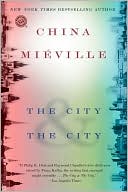Balls and Walnuts
more than you ever wanted to know
The City & The City
 The City & The City by China Miéville, 2009. I’ve perhaps mentioned once or twice that China Miéville has left me cold. I couldn’t finish King Rat or Perdido Street Station, and after dropping cash on those two books only to be disappointed, I’d kind of put him off my radar. I’m not sure what led me to check up on him again after all these years, but I’m glad I did. The City & The City was a great read — a technically proficient hardboiled mystery and also a provocative fantasy (or anti-fantasy, an idea Miéville kicks around in the end-of-book interview).
The City & The City by China Miéville, 2009. I’ve perhaps mentioned once or twice that China Miéville has left me cold. I couldn’t finish King Rat or Perdido Street Station, and after dropping cash on those two books only to be disappointed, I’d kind of put him off my radar. I’m not sure what led me to check up on him again after all these years, but I’m glad I did. The City & The City was a great read — a technically proficient hardboiled mystery and also a provocative fantasy (or anti-fantasy, an idea Miéville kicks around in the end-of-book interview).
The conceit is that two cities, Beszel and Ul Qoma, coexist in the same space. This is far more a psychological separation than a physical one, however, since there are areas which are purely one or the other, and areas where the two interleave. From an early age, denizens of either city are taught to un-see the cars, pedestrians, and buildings of the other city. To screw up — to breach, in the novel’s parlance (think “breach of etiquette”) risks invoking a police force that exist hidden from both cities: the aptly named Breach.
Our first person narrator is Inspector Tyador Borlú of the Extreme Crime Squad, a Beszel native investigating the murder of a young woman whose body, we soon learn, has been transported from Ul Qoma and dumped in Beszel. This should be a clear case for Breach, and Borlú would like nothing better than to make his case for Breach and wash his hands of the case. But of course others have different plans.
The prose at times is often spare to a fault, but lush at other times, and full of idiomatic and dictional oddities that suggest translation from another language. Miéville’s comments indicate emulation of Raymond Chandler, but I think Hemingway may be a more apt comparison. Borlú’s a likable enough protagonist, but we’re given precious little window into his thoughts beyond the working of the case. Chandler’s Marlowe was far more revealing: we knew the man’s value system, after all, and I’d argue that if we didn’t, he wouldn’t be Marlowe. Borlú wants to see justice done, but aside from that, I don’t know what he wants out of life.
That quibble aside, Miéville has done some remarkable world-building, and his characters live and breathe, and his plot is as well crafted as any jigsaw puzzle. What more could you want? Yes, I wish I cared more about Borlú. Emotional distance must have been a conscious decision on Miéville’s part since it would have been easy enough to humanize the man.
Oh, and Miéville didn’t answer every last question his novel raised . . . which would be fine if he intended a sequel, but his interview discusses only the possibility of prequels. But I guess I don’t need to know everything, since the mystery itself was explained in full.
Now I’m wondering whether to go back to Miéville, perhaps give him a chance with his new book Kraken, which seems to be an homage to H. P. Lovecraft. Guess that’s what Amazon’s “Look Inside” function is good for, right?
D.